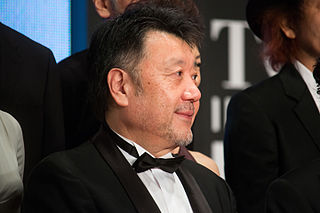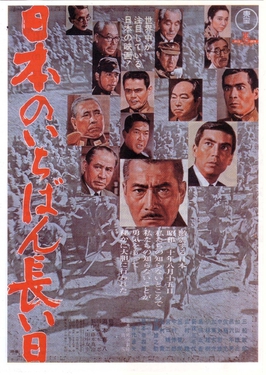
Masato Harada is a Japanese film director, film critic, and sometimes an actor; he is best known to foreign audiences as Omura in The Last Samurai and as Mr Mita in Fearless. In both his acting roles he portrayed the villain who wants Japan to westernize under the Meiji Restoration in the meantime trying to remove the old ways.
Moeyo Ken is a novel by Japanese author Ryōtarō Shiba. It dramatizes the life of Hijikata Toshizō, a member of the Shinsengumi, active in Japan during the bakumatsu.

Blue Christmas, also known as Blood Type: Blue or The Blue Stigma, is a 1978 Japanese science fiction film by director Kihachi Okamoto. It deals with prejudice against UFO witnesses whose blood is turned blue by the encounter.
Sex & Fury is a 1973 Japanese action-thriller film directed by Norifumi Suzuki and starring Reiko Ike.
The Family is a 1973 novel by Toyoko Yamasaki. It has been adapted into a film in 1974 and then three times as a television series in 1974, 2007, and 2021.
Hush! is a Japanese film directed by Ryōsuke Hashiguchi, starring Seiichi Tanabe, Kazuya Takahashi and Reiko Kataoka, released in 2001.

Lorelei: The Witch of the Pacific Ocean, known in Japan as simply Lorelei, is a 2005 Japanese war drama film directed by Shinji Higuchi. In the film, the Imperial Japanese Navy save Tokyo from a third atomic bomb during World War II. The film was the highest-grossing film in Japan during the week of its release.
Spellbound is a 1999 Japanese film directed by Masato Harada.

Bounce Ko Gals is a 1997 Japanese crime drama film written and directed by Masato Harada. Its alternative English-language titles are Call Girls and Leaving.
Spy Sorge (スパイ・ゾルゲ) is a Japanese film directed by Masahiro Shinoda in 2003, about the Soviet spy Richard Sorge. Shinoda intended the film, a long and lavish production that had only modest critical and commercial success, as his final feature.

47 Ronin is a 1994 Japanese film directed by Kon Ichikawa. The film is another version of the Chūshingura, the story of the revenge of the forty-seven rōnin of Ako against Lord Kira.

Beyond Outrage is a 2012 Japanese yakuza film directed by Takeshi Kitano, starring Kitano, Toshiyuki Nishida, and Tomokazu Miura. It is a sequel to Kitano's 2010 film Outrage and is followed by the 2017 film Outrage Coda.

Isoroku is a 2011 Japanese biographical film about Isoroku Yamamoto. Other English home media titles of the film are The Admiral, and Admiral Yamamoto. English titles not used in home video releases are Yamamoto Isoroku, the Commander-in-Chief of the Combined Fleet and Admiral Isoroku.
The 17th Yokohama Film Festival (第17回ヨコハマ映画祭) was held on 4 February 1996 in Kannai Hall, Yokohama, Kanagawa, Japan.

The Light Shines Only There is a 2014 Japanese drama film directed by Mipo O. It was selected as the Japanese entry for the Best Foreign Language Film at the 87th Academy Awards, but was not nominated.

Japan's Longest Day is a 1967 Japanese epic war film directed by Kihachi Okamoto. The subject of the majority of the movie is the period between noon on August 14, 1945, and noon on August 15, 1945, when Emperor Hirohito's decision to surrender to the Allies in World War II was broadcast to the Japanese people, and the attempted coup d'état to prevent that from happening. Film historian Joseph L. Anderson describes the film as "a meticulous reconstruction of the day Japan surrendered and thus ended the Pacific War.
The Japanese Movie Critics Awards are presented annually since 1991.
Imperial Navy is a 1981 Japanese war film directed by Shue Matsubayashi. The film is a retelling of the downfall of Japan's Imperial Navy during World War II.

Casting Blossoms to the Sky is a 2012 Japanese drama film directed by Nobuhiko Ôbayashi.